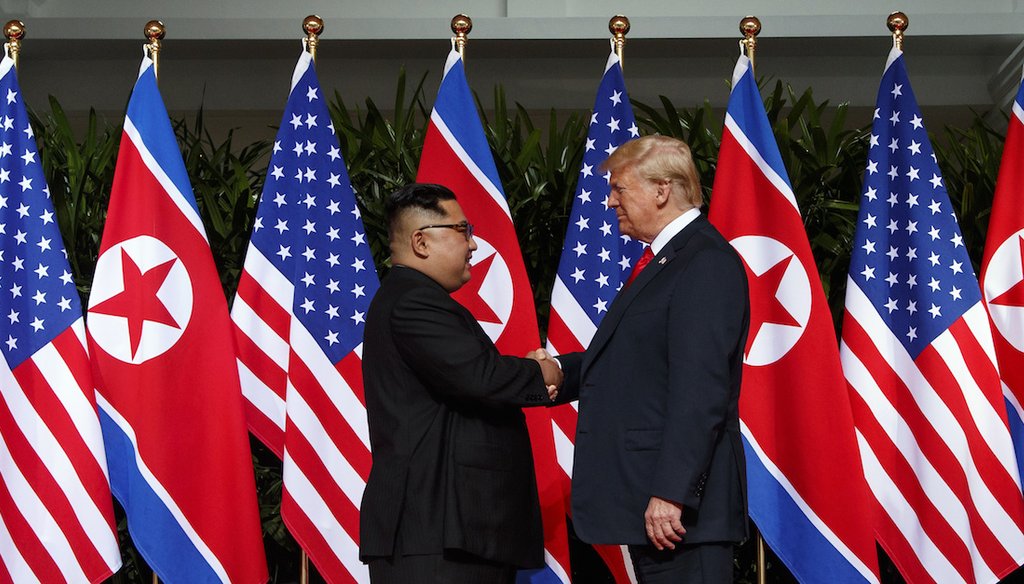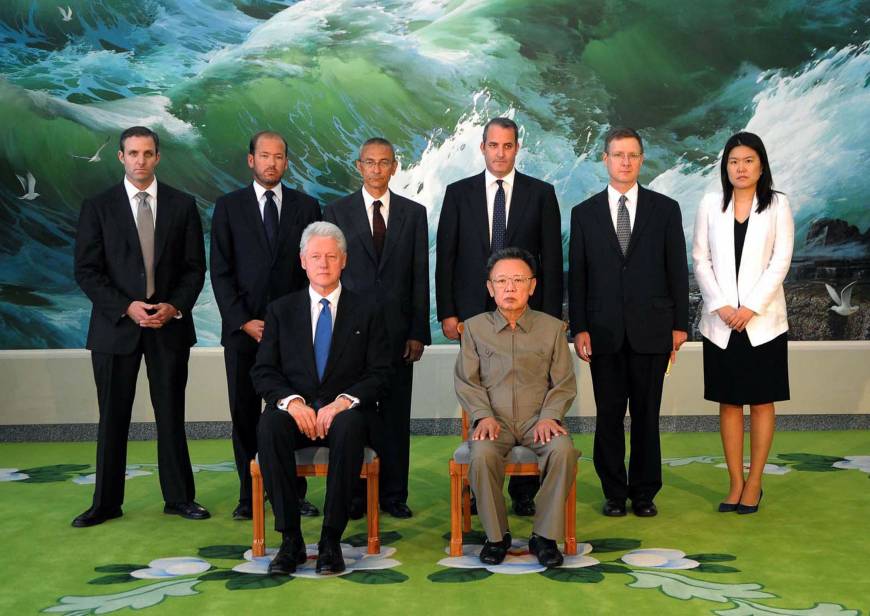Stand up for the facts!
Our only agenda is to publish the truth so you can be an informed participant in democracy.
We need your help.
I would like to contribute

North Korean leader Kim Jong Un and U.S. President Donald Trump shake hands prior to their meeting on Sentosa Island in Singapore on June 12, 2018. (AP)
President Donald Trump detailed his discussion with North Korean dictator Kim Jong Un during a lengthy news conference following the leaders’ June 12 summit in Singapore.
Trump described the meeting as a success, reporting that North Korea would dismantle its nuclear arsenal "very quickly." Reporters pressed Trump for details on the process and whether he brought up North Korea’s human rights violations against its people and U.S. citizens, which Trump largely glossed over.
Trump also touched on trade deficits and NATO, just days after a G-7 summit of U.S. allies ended on an acrimonious note over trade disputes.
Here a few of the most notable statements by Trump, with additional context.
On North Korea
"We haven’t given up anything other than … I agreed to meet."
The accuracy of this statement depends on what happens with longstanding military exercises on the Korean peninsula. A suspension or an end to the exercises, as Trump floated during a press conference after the summit, would be significant.
"It would be a dramatic concession under any circumstances, but is particularly unsettling because it doesn’t appear that anything was gained in return for it," said Stephan Haggard, director of the Korea-Pacific Program at the University of California-San Diego.
But an end to the U.S.-South Korean exercises was not included in the joint statement Trump and Kim released after the summit, and it’s unclear whether it will happen.
Trump initially told reporters withdrawing U.S. soldiers in South Korea was "not part of the equation" but something he wanted to do. "We will stop the war games," he continued.
When pressed by reporters, Trump called the exercises "provocative," adding, "Under the circumstances we are negotiating a comprehensive and complete deal. It is inappropriate to have war games. No. 1, we save money. A lot. No. 2, it is really something they very much appreciated."
The reporting immediately afterward indicated that key entities including the U.S. military and South Korea’s government were caught off-guard by the idea. (One exercise is scheduled for August.)
We should note that, even if Trump backs off and allows the military exercises to continue unabated, it has not been an insignificant concession to agree to meet with the leader of North Korea in the first place. That’s something that has never happened before, and is a goal long sought by the North Koreans.
A summit afforded Kim, the leader of a country with a poor human rights record, a chance to appear on the world stage as an equal to the world’s leading superpower. And Trump offered a decidedly warm touch in his appearances with Kim. In one of the closest previous examples — when former president Bill Clinton met with Kim’s father, Kim Jong Il, in 2009 to secure the release of two journalists — Clinton’s pose with the elder Kim was essentially a grimace.
In Singapore, by contrast, Trump, "showered Kim with praise, calling the dictator who leads one of the planet’s most oppressive and brutal regimes ’smart’ and ‘very talented,’ declaring the meeting ‘a great honor’ and saying he trusts Kim," Bloomberg reported. "They greeted each other with a 13-second handshake, then retired for a 38-minute private meeting before being joined by aides. There were multiple photo ops, including a walk through the hotel’s garden, more hand shakes, pats on the back and finally the signing ceremony."
"We have done exercises working with South Korea for a long time. We call them war games. I call them war games. They are tremendously expensive."
Trump may call them "war games," but the term used historically by U.S. officials is "military exercises." Michael McFaul, who was ambassador to Russia under President Barack Obama, tweeted, "Hey commentators, they are not ‘war games.’ That’s what our enemies call them. They are ‘military exercises.’"
Exercises of this sort "are the core of an alliance," said John Pike, director of globalsecurity.org. "They ensure that forces from different countries can fight together. Without the exercises, the U.S.-Republic of Korea relationship is a ‘treaty of friendship’ rather than an alliance."
The specific dollar cost is hard to determine, and certainly any large-scale military exercise will cost significant money, experts said.
That said, once the United States has decided to establish a military presence on the peninsula, the additional costs of exercises are modest. The big ongoing costs are for military bases and for military and support personnel.
"If the forces weren’t conducting an exercise, they would likely still be conducting other routine operations and training. So the increase in costs is rather marginal," said Todd Harrison, director of defense budget analysis at the Center for Strategic and International Studies. "Regardless of the exact figure, it is a relatively small amount compared to the $700 billion total budget for national defense."
Trump’s comment about the exercises’ expense is especially jarring, Haggard said, since he has repeatedly touted how much the spending bills he’s signed have provided for the military.
"He says he wants to spend on the military but then seems unwilling to maintain its readiness for one of the more important tasks of deterrence the U.S. faces," Haggard said.
"Scientifically, I’ve been watching and reading a lot about this, and it does take a long time to pull off complete denuclearization. … Scientifically, you have to wait certain periods of time, and a lot of things happen. But despite that, once you start the process it means it’s pretty much over."
Trump is right that denuclearization is a lengthy process, but not on the point that it is irreversible.
Siegfried S. Hecker, a professor at Stanford’s Center for International Security and Cooperation and former director of the Los Alamos weapons laboratory in New Mexico, estimated denuclearization of North Korea would take up to 15 years in a report that was circulated to some administration officials, according to the New York Times.
Richard Nephew, senior research scholar at the Center on Global Energy Policy, told us that complete denuclearization of a program like North Korea's would take considerable time given the requirements to decontaminate, dismantle and verify the absence of other nuclear activities.
But Trump’s claim that once the process begins "it’s pretty much over" is nonsensical, experts say.
North Korea "has decades of experience in designing nuclear weapons and producing the material for them," Nephew said. "Unless you are prepared to sequester the technicians and scientists involved, seize their materials and ensure no others remain, there is nothing about North Korea's nuclear weapons program that will be irreversible forever and ever. The question is whether you could detect such a move and deter such a move."
If Trump "thinks that there is some magic point of irreversibility, particularly one that is arrived at early in the process, he is in error," Pike said. "A few years back, they blew up the cooling tower at Yongbyon, but were soon back in business. They blew up their nuclear testing tunnels a few weeks ago, but North Korea is one big piece of Swiss cheese — they are really good at digging more tunnels. That site was broken anyway, and the North has probably finished its nuclear test program anyway."
Pike added that verification — which was not included in the agreement but Trump told reporters would happen — "would be nearly hopeless."
"There are too many ‘magic mountains’ where stuff can be hidden," he said. "Verification would require full access to program records and would require confidence that the records were complete and accurate."
"This isn’t the past. This isn’t another administration that never got it started and therefore never got it done."
Over the decades, North Korea has signed off on a several agreements, only to change its mind later. In 1992, months after President George H.W. Bush removed tactical nuclear weapons from South Korea, the two Koreas signed a joint declaration on the denuclearization of the entire peninsula.
The next year, North Korea threatened to withdraw from the Nonproliferation Treaty. That led to another round of talks, which in 1994 produced the Agreed Framework. Under that deal, North Korea froze its plutonium production in exchange for fuel and more open trade.
But by 2002, that agreement ended after it became clear that North Korea was refining uranium, a pathway to producing weapons-grade material. Each side disputed whether that was included in the 1994 agreement. North Korea formally backed out of the Nonproliferation Treaty and in 2006, it tested its first nuclear bomb.
Another agreement emerged in 2007. The Six Party Talks laid out a series of steps that North Korea and a group of five nations -- China, Russia, the United States, Japan and South Korea -- would take with the ultimate goal of denuclearization of the Korean Peninsula. The United States and North Korea agreed to move toward full diplomatic relations.
In the years that followed, the Six Party Talks faltered and in 2010, North Korea revealed it had a centrifuge facility for uranium enrichment. More nuclear tests started in 2013. North Korea continued to develop missiles to deliver nuclear warheads.
The general pattern has been that North Korea took some steps to curtail its nuclear weapons program in exchange for fuel and relief from economic sanctions. It put denuclearization and normalized relations on the table. But ultimately, its long-term plan to become a nuclear-capable nation won out over each agreement.
On trade
"The United States, now, is almost twice the size of the economy of China."
Trump isn’t far off on this statement, which he mentioned in the context of China’s prospective involvement in a long-term peace agreement. The United States’ GDP is $18.624 trillion, according to the World Bank. China’s is $11.199 trillion. That’s about 1.7 times bigger.
"We have a big trade deficit with Canada."
Continuing his feud with Canadian Prime Minister Justin Trudeau, Trump again painted an incomplete picture of the trade relationship.
In 2017, the United States had a $23.2 billion deficit with Canada in goods. (In other words, the United States in 2017 bought more goods from the Canada than Canada bought from the United States.)
However, the United States had a $25.9 billion surplus with Canada in services — and that was enough to overcome that deficit and turn the overall balance of trade into a $2.8 billion surplus for the United States in 2017.
"$151 billion (trade deficit) with the European Union."
Trump again omits trade in services, which inflates the U.S. trade deficit. The European Union had a $153 billion trade surplus in goods with the United States in 2017 but a total trade surplus of $101 billion when services were factored in.
"We’re paying for ... — I mean, anyone can say — from 60 to 90 percent of NATO. And we’re protecting countries of Europe. And then on top of it, they kill us on trade."
By NATO’s count, total defense spending of all NATO members stood at about $917 billion in 2017 in current dollars. The United States’ share was about $618 billion. Do the math, and the percentage comes to about 67 percent.
But these don’t represent dollars or euros spent on behalf of NATO. These figures are the total defense budgets of the NATO members, including spending on projects far from NATO’s purview.
On the other hand, NATO has common military expenses on the order of $2 billion a year. The U.S. share of that is about 22 percent. But those dollars exclude the vast spending it takes to sustain American forces, equipment and bases across Europe. And in a final twist, even those expenditures aren’t solely for the benefit of Europe.
On human rights
Trump fielded a number of questions about North Korea’s human rights record.
"I believe it’s a rough situation over there. There’s no question about it. And we did discussed it today pretty strongly. I mean, knowing what the main purpose of what we were doing is: denuking. But discussed it at pretty good length. We’ll be doing something on it. It’s rough. It’s rough in a lot of places, by the way. Not just there."
Francisco Bencosme, Asia Pacific Advocacy Manager at Amnesty International USA, said Trump creates a "false equivalency."
"The United Nations Commission of Inquiry has in the past called North Korea a country whose ‘gravity, scale, and nature’ of human rights violations do not ‘have any parallel in the contemporary world,’" Bencosme said.
"There has been no change in this situation reported by the UN, so it is surprising — and quite shocking — that President Trump made no mention of the Commission of Inquiry, or indeed of any other credible reporting on the massive human rights violations that from all accounts are ongoing in N. Korea," said Susan Akram, director of the International Human Rights Clinic at Boston University School of Law.
Our Sources
White House.gov, Press Conference by President Trump, June 12, 2018
CNN, "Full text of Trump-Kim signed statement," June 12, 2018
Vox.com, "Full transcript of Trump’s North Korea summit press conference," Jun 12, 2018
Reuters, "Trump surprises with pledge to end military exercises in South Korea," June 12, 2018
Stars and Stripes, "U.S. will halt 'provocative' war games with South Korea, Trump says," June 12, 2018
Bloomberg, "Trump Gave Kim a Summit But Left With Little to Show for It," June 12, 2018
Axios, "Trump: U.S. ending "war games" on Korean peninsula," June 12, 2018
Japan Times, "Hacked memo reveals details of Bill Clinton’s 2009 meeting with North Korea’s Kim Jong Il," Oct. 30, 2016
Michael McFaul, tweet, June 12, 2018
NATO, Defence Expenditure of NATO Countries (2010-2017), March 15, 2018
World Bank, GDP, accessed June 12, 2018
New York Times, Trump Exaggerates Trade Deficit With European Union by $50 Billion, June 7, 2018
PolitiFact, Here's what's wrong about Donald Trump's attack on Canada trade deficit, March 15, 2018
New York Times, North Korea Nuclear Disarmament Could Take 15 Years, Expert Warns, May 28, 2018
New York Times, Clinton Approves a Plan to Give Aid to North Koreans, Oct. 19, 1994
PolitiFact, Viral image wrongly blames Bill Clinton for giving North Korea the means to make nuclear weapons, Aug. 9, 2017
Email interview with Kingston Reif, director of disarmament and threat reduction policy at the Arms Control Association, June 12, 2018
Email interview with Susan Akram, director of the International Human Rights Clinic at Boston University School of Law, June 12, 2018
Email interview with Richard Nephew, senior research scholar at the Center on Global Energy Policy, June 12, 2018
Email interview with John Pike, director of globalsecurity.org, June 12, 2018
Email interview with Stephan Haggard, director of the Korea-Pacific Program at the University of California-San Diego, June 12, 2018
Email interview with Todd Harrison, director of defense budget analysis at the Center for Strategic and International Studies, June 12, 2018




 PolitiFact Rating:
PolitiFact Rating: 
 PolitiFact Rating:
PolitiFact Rating:  PolitiFact Rating:
PolitiFact Rating:  PolitiFact Rating:
PolitiFact Rating: 


































